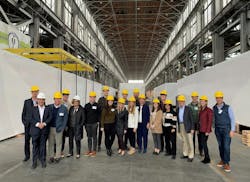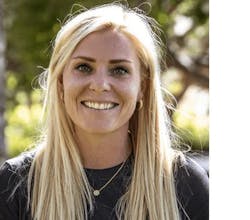Abby Ivory and The Ivory Prize’s Impact on Affordability
The annual Ivory Prize is designed to find, recognize, and help further deploy innovative solutions that improve housing affordability. But according to Abby Ivory, managing director of the not-for-profit Ivory Innovations, and Michael Parker, VP of strategy at Ivory Homes, the extent of the prize’s impact extends much further.
The innovative approaches conceived and executed by the 2022 Ivory Prize winners across three categories aren’t just causing positive changes in their respective communities; their ideas serve as prototypes for comprehensive solutions that can be implemented on a national scale. Tackling everything from racial inequality to an ever-growing housing supply and skilled labor crisis, they are carving out a brighter future for everyone.
PRO BUILDER: How did Ivory Innovations come about?
Abby Ivory: Ivory Innovations started almost five years ago. We came up with something called the Ivory Prize, which lets us look at—and recognize—for-profit and nonprofit companies and government entities for innovative ideas throughout a given year. We look at all of those things together as a landscape of what’s happening in the country and what’s happening differently than the year before.
In the process, we try to pick up on innovations that are working to address housing affordability, award prizes for the best of them, and then work with the top 25 finalists each year to help them grow and scale their ideas because when we see ideas that we think are really interesting, we want to see them move forward.
RELATED
- Builder of the Year Ivory Homes' Innovation Agenda
- Ken Calligar Is Shaping a New Era of Resilient Construction
- Solutions to Housing Affordability
PB: How do you find these innovations?
Michael Parker: College students are at the core of what we do. We have almost 40 universities that participate in what we call Hack-A-House competitions, which challenge them to offer up their best ideas to address affordability in 24 hours. Some of those students help us find companies to consider for the Ivory Prize, which gives us a vibrant lens of the whole industry.
PB: Tell us about your selection process. What are you looking for in a winner?
AI: Our selection process starts in the fall. We loop in a ton of students from the University of Utah who find the initial candidates. People can self-nominate, and we have a really great network that will send us nominations all the time. Outside of that, we have students doing research constantly to find innovative candidates. We had 170 companies come through our initial intake process this year, and then we have an advisory board that runs through a selection process in early January to bring that group down to 25.
Judges are really looking for innovation, overall affordability, potential to scale, replicability, and usefulness for the long-term. We try to assess those characteristics with people who are actually building homes. After judges select the top 25, the finalists are narrowed down to a top 10, and then the top three are ultimately awarded. We’re very hands-on with the selection process. We meet all of the candidates and dive into their plans to ensure that we’re making the right selections.
PB: Can you tell us about this year’s winners and why they were selected?
AI: Our Construction and Design category winner is Volumetric Building Companies, a Philadelphia-based group. It has been really interesting to see their ability to produce homes affordably, at scale, using modular construction.
On the Policy side, Build Up, in Birmingham, Ala., puts a real dent in the labor shortage by educating students and giving them the skills our industry desperately needs. The cost of labor is going up, but that also means salaries are going up, so helping young people see this as a viable career option is really important, especially for someone who doesn’t think they want to go to college or pursue a traditional education.
Our Finance winner this year is Blackstar Stability, in Washington, D.C. They’re working to expand equitable ownership of affordable single-family homes by attacking predatory lending practices in the South and Midwest, and they have a good blueprint for making that solution a reality.
PB: How do you see the Ivory Prize serving as a precedent for industry progress?
AI: The housing sector is a bit antiquated and averse to change. The role we’re hoping to play is essentially being a catalyst for change in this market to help people feel comfortable with that change, whether it means implementing a new financing tool or building in a new way.
We’re willing to try something that maybe someone else isn’t willing to try, and the other side of that is about connecting all of these people who are really interested in doing something in this space and who care about the issue. We’re opening up a larger conversation in the industry, which is really amazing.
MP: Beyond that influence and leadership in innovation, our legacy is that we’re getting a lot of youth involved, too. They’re going to have a lasting impact because they’ll carry the baton well beyond my generation.
We build communities, neighborhoods, and homes. It’s different from every other product. Getting youth excited about housing, housing affordability, construction, and the complexities of finance is really the way forward. There’s truly a place for everyone in this industry.
PB: What types of organizations would you encourage to enter into the Ivory Prize competition in the years to come?
AI: We're looking for someone who's doing something unique that is scaling or has the real potential to scale, but it's also innovating and it's pushing people. I love to see finalists who are overcoming barriers that are being thrown at them and they're still making their way forward. We’ve seen a lot of that with this year’s group.
MP: I usually spend most of my time adding value on the policy front, but I think, quite frankly, I'm looking for bolder solutions on that side of the coin. The tone is shifting on the policy front at a local level, but the boldness of solutions is not. In future years, I'm really hopeful that we start to see cities, counties, states, and even the federal government, as well as nonprofits and other actors in that space. Housing is the most regulated industry, in my opinion. There are lots of levers for policy to pull to find solutions instead of nibbling around the edges. Think big and be positive.


